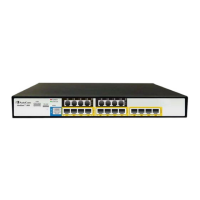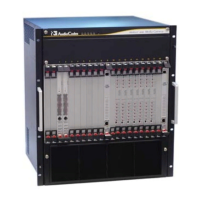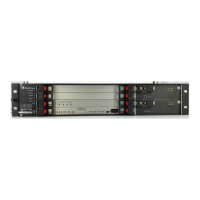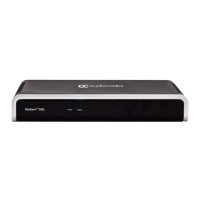Version 6.2 87 February 2011
SIP User's Manual 3. Web-Based Management
Parameter Description
Web/EMS: Interface Name
[InterfaceTable_InterfaceName]
Defines a string (up to 16 characters) to name this interface.
This name is displayed in management interfaces (Web, CLI
and SNMP) for clarity (and has no functional use), as well as
in the 'SIP Media Realm' and 'SIP Interface' tables.
Notes:
This parameter is mandatory.
The name must be unique for each interface.
WAN Interface Name
[WanInterfaceName]
Associates the WAN interface with the VoIP traffic (i.e., SIP
signaling and media / RTP interfaces). The available WAN
interface options depends on the hardware configuration (e.g.,
Ethernet, T1, or SHDSL) and/or whether VLANs are defined
for the WAN interface (see Virtual LAN Interface (VLAN) on
page 301). If VLANs a
re configured, for example, for the
Ethernet WAN interface (see Data Settings on page 222), then
you can
select the WAN VLAN on which you want to run these
SIP signaling and/or media interfaces.
The WAN interface can be assigned to SIP signaling and
media interfaces in the SIP Interface table (see Configuring
SIP Interface Table on page 117) a
nd SIP Media Realm table
(see Configuring Media Realms on page 109), wh
ere the WAN
interface is denoted as "WAN".
Once this association is set, VoIP traffic is sent via the WAN
and incoming traffic is identified as coming from the WAN. The
device also automatically configures the required port
forwarding and static NAT rules.
Notes:
For this parameter to take effect, a device reset is required.
If you do not assign the WAN interface to SIP and media
interfaces, then the WAN interface may not be used for
VoIP traffic. In such scenarios, the VoIP traffic can be sent
and received within the LAN, or sent to the WAN via a third-
party LAN router. If a third-party router is used as the
interface to the WAN, then you need to define NAT rules
(using the NATTranslation parameter) to translate the VoIP
LAN IP addresses (defined in the Multiple Interface table
and associated with SIP and media interfaces) into global,
public IP addresses.
This parameter is applicable only if the data-routing
functionality is supported (i.e., relevant Software Upgrade
Feature Key is installed on the device).

